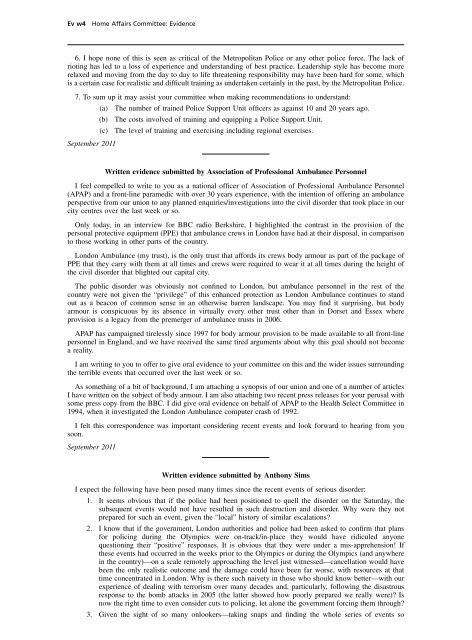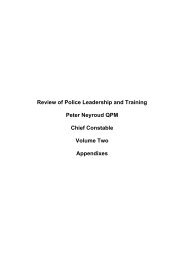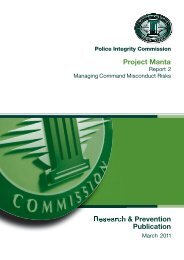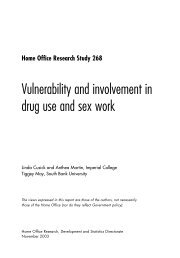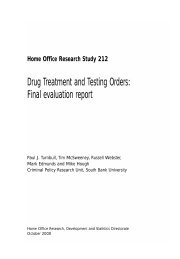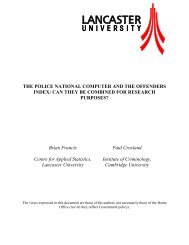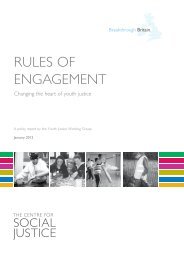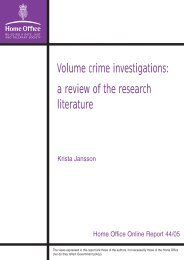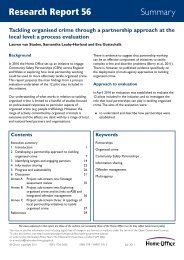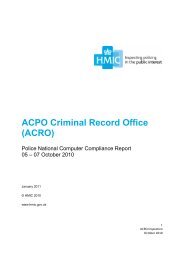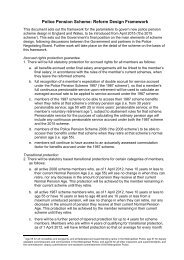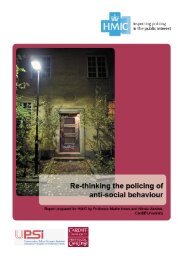Policing Large Scale Disorder: Lessons from the disturbances of ...
Policing Large Scale Disorder: Lessons from the disturbances of ...
Policing Large Scale Disorder: Lessons from the disturbances of ...
Create successful ePaper yourself
Turn your PDF publications into a flip-book with our unique Google optimized e-Paper software.
Ev w4 Home Affairs Committee: Evidence<br />
6. I hope none <strong>of</strong> this is seen as critical <strong>of</strong> <strong>the</strong> Metropolitan Police or any o<strong>the</strong>r police force. The lack <strong>of</strong><br />
rioting has led to a loss <strong>of</strong> experience and understanding <strong>of</strong> best practice. Leadership style has become more<br />
relaxed and moving <strong>from</strong> <strong>the</strong> day to day to life threatening responsibility may have been hard for some, which<br />
is a certain case for realistic and difficult training as undertaken certainly in <strong>the</strong> past, by <strong>the</strong> Metropolitan Police.<br />
7. To sum up it may assist your committee when making recommendations to understand:<br />
September 2011<br />
(a) The number <strong>of</strong> trained Police Support Unit <strong>of</strong>ficers as against 10 and 20 years ago.<br />
(b) The costs involved <strong>of</strong> training and equipping a Police Support Unit.<br />
(c) The level <strong>of</strong> training and exercising including regional exercises.<br />
Written evidence submitted by Association <strong>of</strong> Pr<strong>of</strong>essional Ambulance Personnel<br />
I feel compelled to write to you as a national <strong>of</strong>ficer <strong>of</strong> Association <strong>of</strong> Pr<strong>of</strong>essional Ambulance Personnel<br />
(APAP) and a front-line paramedic with over 30 years experience, with <strong>the</strong> intention <strong>of</strong> <strong>of</strong>fering an ambulance<br />
perspective <strong>from</strong> our union to any planned enquiries/investigations into <strong>the</strong> civil disorder that took place in our<br />
city centres over <strong>the</strong> last week or so.<br />
Only today, in an interview for BBC radio Berkshire, I highlighted <strong>the</strong> contrast in <strong>the</strong> provision <strong>of</strong> <strong>the</strong><br />
personal protective equipment (PPE) that ambulance crews in London have had at <strong>the</strong>ir disposal, in comparison<br />
to those working in o<strong>the</strong>r parts <strong>of</strong> <strong>the</strong> country.<br />
London Ambulance (my trust), is <strong>the</strong> only trust that affords its crews body armour as part <strong>of</strong> <strong>the</strong> package <strong>of</strong><br />
PPE that <strong>the</strong>y carry with <strong>the</strong>m at all times and crews were required to wear it at all times during <strong>the</strong> height <strong>of</strong><br />
<strong>the</strong> civil disorder that blighted our capital city.<br />
The public disorder was obviously not confined to London, but ambulance personnel in <strong>the</strong> rest <strong>of</strong> <strong>the</strong><br />
country were not given <strong>the</strong> “privilege” <strong>of</strong> this enhanced protection as London Ambulance continues to stand<br />
out as a beacon <strong>of</strong> common sense in an o<strong>the</strong>rwise barren landscape. You may find it surprising, but body<br />
armour is conspicuous by its absence in virtually every o<strong>the</strong>r trust o<strong>the</strong>r than in Dorset and Essex where<br />
provision is a legacy <strong>from</strong> <strong>the</strong> premerger <strong>of</strong> ambulance trusts in 2006.<br />
APAP has campaigned tirelessly since 1997 for body armour provision to be made available to all front-line<br />
personnel in England, and we have received <strong>the</strong> same tired arguments about why this goal should not become<br />
a reality.<br />
I am writing to you to <strong>of</strong>fer to give oral evidence to your committee on this and <strong>the</strong> wider issues surrounding<br />
<strong>the</strong> terrible events that occurred over <strong>the</strong> last week or so.<br />
As something <strong>of</strong> a bit <strong>of</strong> background, I am attaching a synopsis <strong>of</strong> our union and one <strong>of</strong> a number <strong>of</strong> articles<br />
I have written on <strong>the</strong> subject <strong>of</strong> body armour. I am also attaching two recent press releases for your perusal with<br />
some press copy <strong>from</strong> <strong>the</strong> BBC. I did give oral evidence on behalf <strong>of</strong> APAP to <strong>the</strong> Health Select Committee in<br />
1994, when it investigated <strong>the</strong> London Ambulance computer crash <strong>of</strong> 1992.<br />
I felt this correspondence was important considering recent events and look forward to hearing <strong>from</strong> you<br />
soon.<br />
September 2011<br />
Written evidence submitted by Anthony Sims<br />
I expect <strong>the</strong> following have been posed many times since <strong>the</strong> recent events <strong>of</strong> serious disorder:<br />
1. It seems obvious that if <strong>the</strong> police had been positioned to quell <strong>the</strong> disorder on <strong>the</strong> Saturday, <strong>the</strong><br />
subsequent events would not have resulted in such destruction and disorder. Why were <strong>the</strong>y not<br />
prepared for such an event, given <strong>the</strong> “local” history <strong>of</strong> similar escalations?<br />
2. I know that if <strong>the</strong> government, London authorities and police had been asked to confirm that plans<br />
for policing during <strong>the</strong> Olympics were on-track/in-place <strong>the</strong>y would have ridiculed anyone<br />
questioning <strong>the</strong>ir “positive” responses. It is obvious that <strong>the</strong>y were under a mis-apprehension! If<br />
<strong>the</strong>se events had occurred in <strong>the</strong> weeks prior to <strong>the</strong> Olympics or during <strong>the</strong> Olympics (and anywhere<br />
in <strong>the</strong> country)—on a scale remotely approaching <strong>the</strong> level just witnessed—cancellation would have<br />
been <strong>the</strong> only realistic outcome and <strong>the</strong> damage could have been far worse, with resources at that<br />
time concentrated in London. Why is <strong>the</strong>re such naivety in those who should know better—with our<br />
experience <strong>of</strong> dealing with terrorism over many decades and, particularly, following <strong>the</strong> disastrous<br />
response to <strong>the</strong> bomb attacks in 2005 (<strong>the</strong> latter showed how poorly prepared we really were)? Is<br />
now <strong>the</strong> right time to even consider cuts to policing, let alone <strong>the</strong> government forcing <strong>the</strong>m through?<br />
3. Given <strong>the</strong> sight <strong>of</strong> so many onlookers—taking snaps and finding <strong>the</strong> whole series <strong>of</strong> events so


